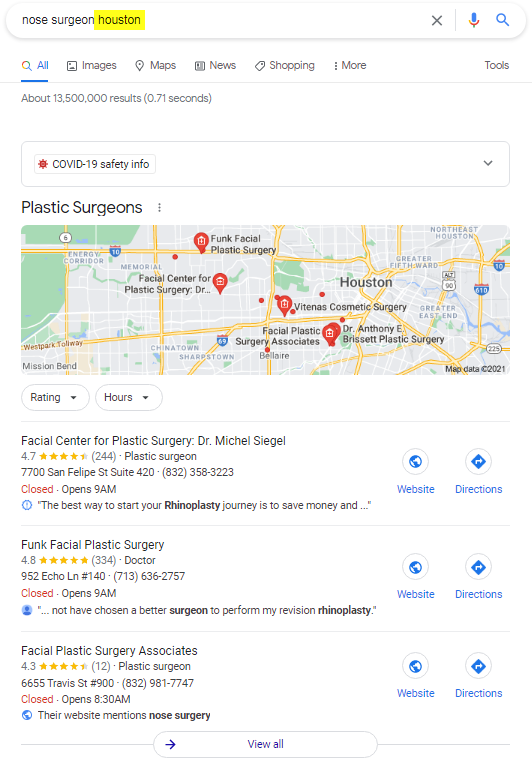[ad_1]
Enterprise homeowners, SEOs, and others consult with good native search rankings as excessive and dangerous rankings as low, however they don’t take a look at whether or not their rankings are thick or skinny. For those who simply flip your head to the aspect 90 levels, you’ll see weaknesses and alternatives you most likely missed earlier than. You’ll see methods to thicken up your native visibility, and that can be superb for enterprise.
What’s a “skinny” rating? The quick reply is it’s the identical downside as when a baseball crew doesn’t have a “deep bench,” and loses a sport each time one thing goes even a bit of flawed. You need visibility / rankings that may stand up to rather a lot going flawed, as a result of in the event you’re in enterprise for lengthy sufficient and in the event you rely on Google visibility sufficient, that’s precisely what is going to occur.
The longer reply is your online business most likely has skinny rankings any time a number of of those describes your scenario:
1. Just one web page in your website ranks for something, and the remainder of your pages limp alongside. On this case, the least-bad scenario is that if your homepage hauls in most of your rankings – because it usually the case – as a result of it’s almost definitely to rank for a spread of phrases. But when a subpage brings you most of your rankings and/or site visitors? That’s thinner ice.
2. Just one location ranks properly, if your online business is multi-location. There’s no cause to anticipate all of them to carry out the identical, and a few cities or cities or neighborhoods are simpler than others. But when there aren’t massive variations in your native search engine optimization technique from one location to the subsequent, then the one location that’s chugging alongside could also be this shut to squeaking alongside the best way your different places do.
3. You’re eligible for “practitioner” pages or “division” pages, however your Google My Enterprise web page for one in all them or for the principle workplace is the one one which ranks on the map. Let’s say you’ve received a single-location dental observe with 3 dentists. Every dentist is eligible for his or her personal GMB web page, and the observe can have one. Would you imagine that’s a complete of 4 – 4! – GMB pages which may rank for this or that?
4. You rank solely in Google Maps / the native pack, and not within the natural outcomes. In my expertise, the Maps / 3-pack rankings are extra unstable than the natural outcomes are. Needless to say many natural outcomes are location-specific, and have been for a few years. (So I’m not saying you could rank within the natural outcomes throughout the nation or in different international locations.)
5. You rank solely within the (localized) natural outcomes, and never in Google Maps / the native pack. After all, the map is fairly seen, and also you need to be there, ideally with some natural rankings, too. By the best way, as it’s possible you’ll observed, your natural search engine optimization (i.e. on-page content material / optimization and hyperlinks) is an enormous issue in the way you do on the map.
6. You rank just for phrases which can be equivalent, just like, or a part of your online business identify. Except you carry out just one service or promote just one widget, then you’re the panda bear of the native search outcomes – all the time one dangerous meal or extra-slow mating season away from extinction. Particularly if that “enterprise identify” is just not your actual enterprise identify in any respect, however relatively a keyword-rich one which’s designed simply to assist your Google My Enterprise web page rank, you then’re weak to a competitor’s enhancing out the key phrase or time period. You’ll most likely proceed to rank for that time period, even when it’s now not a part of your identify, however in time you’ll most likely drop.
7. You rank just for geographically express search phrases, the place town identify or different place identify is in the question. Most searchers received’t really specify the place they need to see outcomes, as a result of they know that Google is aware of the place they’re positioned and can present close by outcomes by default. Use Google’s Nameless Advert Preview Device to see the way you maintain up in varied locations for a similar search time period
8. You rank just for geographically broad search phrases, which include a service or product (and perhaps different modifiers, like “close to me”) and no place identify. If these are your solely rankings, your rankings are too location-sensitive, in that Google’s exhibiting you within the search outcomes primarily as a result of the searcher is near you and vice versa. In that case, you could develop the tentacles a bit of.
9. You rank just for native one-box phrases. On this case, both you’re gunning for phrases which have only a few rivals (sensible), or Google has assumed that individuals who sort in these phrases are looking for a selected firm when the truth is they’re looking just for a selected factor and don’t care who gives it.
10. You rank solely in a small geographical space or in a single metropolis. This downside requires none of my colour commentary.
11. A web page – or a weblog put up – in your website that ranks properly solely ranks properly for one stable search time period or for a carefully associated household of search phrases. In different phrases, your best-performing pages are one-hit wonders or perhaps two-hit wonders.
12. Your solely rankings of any sort are in Google. Good factor not too many individuals start their searches in Apple Maps, Yelp, Bing, and the thousand varied listing websites, since you’re not even a chalk define there.
You get the thought. On one stage, the issue is clear: too lots of your eggs are in too few baskets. However the actual downside is that having “skinny” rankings means it’s very straightforward so that you can drop off, or to get knocked off. You probably have some good rankings however you don’t have many rankings, you’re most likely one algorithm replace or one powerful competitor or one decided spammer from uniformly dangerous rankings. One solution to learn my quick-n’-dirty checklist is as an actuarial desk that tells you the probability of a disastrous drop-off in Google.
There’s a psychological part to the issue, too. For those who rank properly just for a couple of phrases, particularly in the event that they’re high-priority search phrases, you most likely received’t need to change a lot or something, since you most likely don’t need to contact something that messes up the light steadiness. Extra seemingly than not, you simply don’t need to bungle issues.
It’s nice if in case you have stable rankings for the phrases you care most about. That’s the 80/20 rule, and I’m an enormous fan of it. However the level is you’ll be able to most likely bump your self up for much more high-payoff native search phrases, and you may hedge with some which can be much less aggressive however nonetheless worthwhile.
How do I counsel you thicken up your skinny rankings? By engaged on this stuff, for starters:
- Crank out service pages. Each for main providers/merchandise and for for more-niche choices. These will assist you to increase not solely your natural rankings, but in addition the vary of phrases you rank for on the map.
- Make spin-off pages at any time when you’ll be able to. Be sure you add loads of inside hyperlinks to these pages. Alongside the best way, it’s possible you’ll get your self a couple of one-box outcomes.
- Work your homepage extra – far more. Don’t simply deal with one service, product, or metropolis.
- Contemplate altering your GMB touchdown web page URL(s). For those who’ve received a multi-location enterprise and a few places are getting beat up on the Google map, level their touchdown web page URLs to the homepage relatively than to a “location” web page.
- Use”practitioner” or “division” Google My Enterprise pages (if relevant) to the fullest. Decide a special GMB class for every (if doable), optimize every individual’s or division’s web page in your web site for various specialties / search phrases, and use that web page as your touchdown web page URL on the corresponding GMB web page. In different phrases, “divide and conquer.”
- Use Google Search Console to check which pages rank and for what particular phrases. Particularly, search for pages that get a number of impressions or clicks for phrases you care about, and add content material to these pages that’s related to different phrases – probably related phrases – that you simply additionally care about. Clearly, Google already digs the web page in some methods, and probably will dig it much more after you place in some extra work.
- Encourage reviewers to go into element of their opinions, significantly in Google Maps opinions. The hope is that they point out particular providers or merchandise, or sure qualities of them.
—
How “thick” are your rankings?
What have you ever finished that’s helped, and what have you ever tried that hasn’t labored?
Any first-hand expertise with being too reliant on a couple of phrases, after which dropping off for these phrases?
Go away a remark!
[ad_2]



